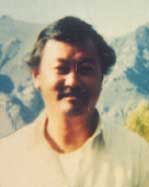
Rinzin Wangyal was first arrested in 1966-67 for allegedly organising an underground movement and served between 15 to 17 years in prison. He was again arrested in 1995 on suspicion of planning to disrupt “TAR” anniversary celebrations for which he is reportedly serving a 16 year prison term. His wife, nearing death, made repeated appeals to the authorities to visit her husband for a final time. The pleas were ignored and it is unknown at this time whether she has since passed away.
Rinzin Wangyal (also known as Rinwang) is a 50-year-old from Lhasa. After 1959, he worked as a construction worker in the “Ngachen Lokhang” electricity unit.
As Rinzin Wangyal was educated in both Tibetan and Chinese, he was later offered a job in the Geographical Department. However, after the Chinese leader Liu Shao Qi lost political power, there was a shift in the Chinese Government’s policy in Tibet. As a result of this, some Tibetans who were accused of holding “wrong political views” were demoted to labourers at the ‘Shuini Chang’ cement factory . Rinzin Wangyal was among those demoted.
Between 1982-1983, Rinzin Wangyal worked at the ‘Jian Zhu Qidui’, a construction unit in Lhasa.
Rinzin’s mother’s name is Ogen Choedon. Rinzin’s late father Lobsang Tsewang was a khenjung (a Tibetan government official of high rank) before the Chinese invasion of Tibet.
Rinzin Wangyal’s wife Sonam is a daughter of the yabshi phunkhang family in Lhasa, the family of the 13th Dalai Lama.
Karma Gelek, the husband of Sonam’s elder sister, Tse-Lha, was arrested in 1994 and is still in prison.
Rinzin Wangyal’s younger brother Tsedor was one of nine youths accused of forming an underground movement. He was executed in 1970.
Between 1987 and 1988, Rinzin visited India to meet his relatives.
Rinzin’s son Tenzin Nyima was a student at the Tibetan Children’s Village School in Dharamsala, India, for some time. He left school when his mother’s health had deteriorated to the point that it was thought that he may never see her again. Tenzin has not returned to school since that time.
While working as a labourer in the cement factory, Rinzin Wangyal was arrested between 1966-1967 for allegedly organising an underground movement. He was imprisoned in Drapchi Prison where he was regularly tortured and interrogated by the prison authorities. Rinzin Wangyal was released from Drapchi Prison between 1982-1983.
In August 1995, Rinzin Wangyal was once again arrested by the Public Security Bureau (PSB). He was suspected of being involved in a political movement aimed at disrupting the celebrations of 1 September 1995 marking the anniversary of the founding of the “Tibet Autonomous Region”.
It was reported that Rinzin Wangyal’s relatives sent three appeals to the PSB requesting permission for a meeting between Rinzin and his wife. His wife Sonam was known to be in a critical condition at this time and was later admitted to Lhasa People’s Hospital. Each appeal letter failed to receive a response.
Accounts differ regarding Rinzin’s wife. Some say that she died in October-November 1996 after being repeatedly refused permission to see her husband for a final time. Another source reports that Sonam is still alive but is in extremely poor health.
Unconfirmed sources from Tibet report that on 13 December 1996 Rinzin Wangyal was sentenced to 16 years imprisonment.
This means that by the time he is released he will have spent more than 30 years of his life in prison for the cause of Tibet.
